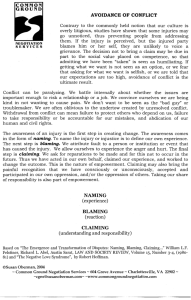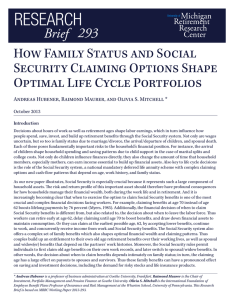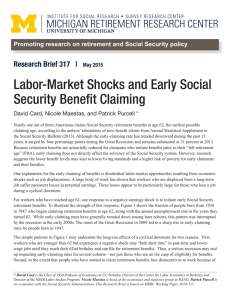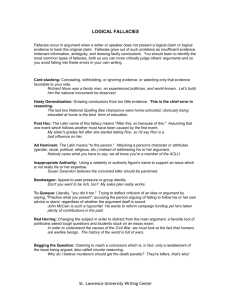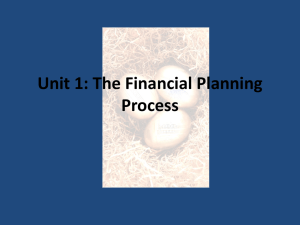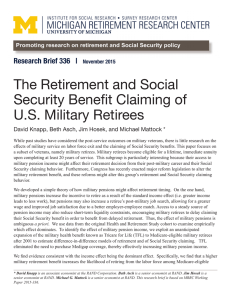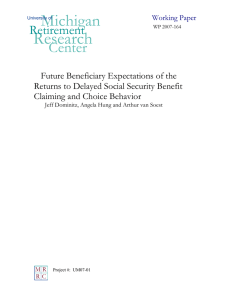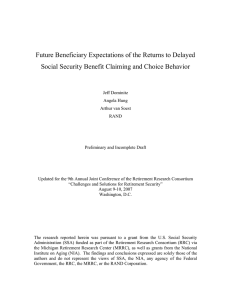Research Michigan Center Retirement
advertisement
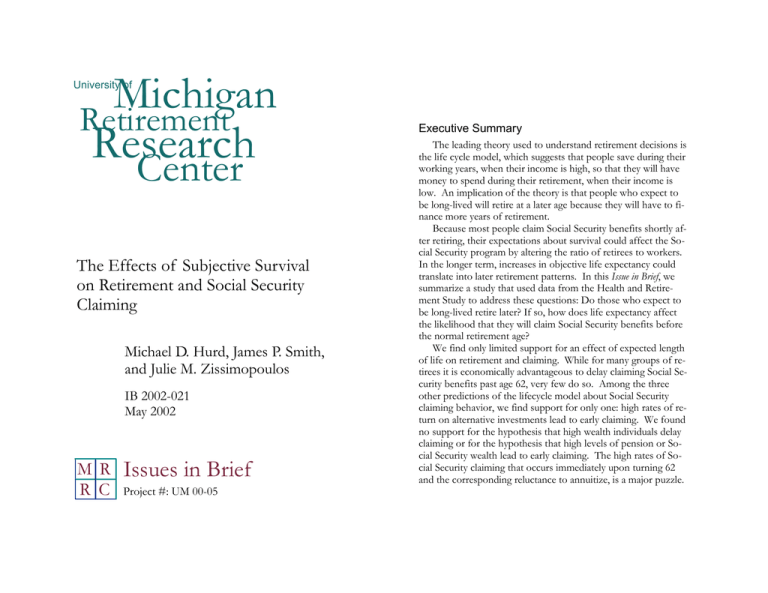
Michigan Retirement Research University of Executive Summary Center The Effects of Subjective Survival on Retirement and Social Security Claiming Michael D. Hurd, James P. Smith, and Julie M. Zissimopoulos IB 2002-021 May 2002 M R R C Issues in Brief Project #: UM 00-05 The leading theory used to understand retirement decisions is the life cycle model, which suggests that people save during their working years, when their income is high, so that they will have money to spend during their retirement, when their income is low. An implication of the theory is that people who expect to be long-lived will retire at a later age because they will have to finance more years of retirement. Because most people claim Social Security benefits shortly after retiring, their expectations about survival could affect the Social Security program by altering the ratio of retirees to workers. In the longer term, increases in objective life expectancy could translate into later retirement patterns. In this Issue in Brief, we summarize a study that used data from the Health and Retirement Study to address these questions: Do those who expect to be long-lived retire later? If so, how does life expectancy affect the likelihood that they will claim Social Security benefits before the normal retirement age? We find only limited support for an effect of expected length of life on retirement and claiming. While for many groups of retirees it is economically advantageous to delay claiming Social Security benefits past age 62, very few do so. Among the three other predictions of the lifecycle model about Social Security claiming behavior, we find support for only one: high rates of return on alternative investments lead to early claiming. We found no support for the hypothesis that high wealth individuals delay claiming or for the hypothesis that high levels of pension or Social Security wealth lead to early claiming. The high rates of Social Security claiming that occurs immediately upon turning 62 and the corresponding reluctance to annuitize, is a major puzzle. Effects of Subjective Survival… 1 Theoretical background A qualified worker who has retired before or at 62 has the choice of claiming Social Security benefits at 62 or of delaying claiming. The delay will result in higher Social Security benefits once they are claimed, but the cost is the benefits lost (not claimed) from 62 until the eventual claiming age. According to the life-cycle model, the choice of whether to claim immediately or to delay will depend on subjective life expectancy. Because the total lifetime payout of Social Security benefits is the annual amount multiplied by the number of years paid, someone who expects to be long-lived may find it financially advantageous to delay claiming: the higher benefit will more than compensate for the benefits forgone in the initial years of delayed claiming. Correspondingly a short-lived person may find it advantageous to claim early because of the shortened payout period. The decision can also be viewed in the context of decision-making under uncertainty. Those who subjectively believe they will be long-lived have an increased risk of living to advanced old age. They will want to protect against having a low level of economic resources by taking action to increase their Social Security benefits. That action is to delay claiming: they give up benefits for several years to obtain a higher future Social Security benefit, implicitly purchasing more Social Security annuities. Those who subjectively expect to be short-lived believe they will not live long enough to spend their wealth, so there is no reason to want larger Social Security benefits. The life-cycle model predicts that those with greater wealth will tend to delay claiming. The more well-to-do are better able to finance spending during the years of delay whereas the less well-to-do may have to reduce consumption while they wait for Social Security benefits to begin. The life-cycle model predicts that the claiming decision will depend on the rate of return on investments such as bonds and stocks. Someone who delays will have to finance spending out of savings, and if the rate of return on those savings is high it would be disadvantageous to take money out of those investments. Thus, high rates of return should be associated with early claiming. Data The Health and Retirement Study (HRS) is a biennial panel survey that began in 1992 with a nationally representative sample of 12,652 individuals born between 1931-41 and their spouses. In addition to questions about their work lives, health and economic status, respondents were asked how likely it was that he or she would live to age 85. Responses to the question on subject survival predict actual mortality in the HRS panel. We use data from four waves of the survey and match these data with restricted data on quarters of Social Security covered earnings to determine whether a HRS respondent is eligible to receive Social Security benefits. Methods We divided the sample into two parts: those who retire before reaching age 62 and those who retire or continue to work after 62. We first relate the propensity to retire before 62 to the expected likelihood of surviving to age 85 (a measure of expected length of life available in the HRS). We then examine the effect of subjective survival on claiming Social Security benefits at age 62 among those who are retired before 62. Because these issues are complicated by the well-established relationship between economic status and life expectancy (poor people die at younger ages and vice versa), our models account for wealth, income, wages, Effects of Subjective Survival… 2 and other indicators of socioeconomic status. We also examine the influence of other pension resources as influences on the retirement decision and compare defined benefit plans (similar to Social Security) and defined contribution plans (such as 401k plans). In a similar way we explore the influence of subjective survival on retirement and on Social Security claiming after age 62. Summary of Major Findings • • • We find that for many groups of retirees it is economically advantageous to delay claiming Social Security benefits past age 62. However, very few do so. For example, 72 percent of workers who retire before age 62 claim within two month of reaching age 62. Among workers who retire by age 63, 81 percent claim benefits by age 63. • probability of retirement by 141 percent. Among workers who retire before age 62, very few observable characteristics differentiate early and late claimers and there is no systematic pattern of claiming as a function of the probability of living to age 85. Stockowners have a greater probability of claiming early benefits, which is consistent with the view that their alternative investment return is higher than those who do not own stock. • Among individuals in the labor force at age 62, workers who state there is no chance they will be alive at age 85 are more likely to retire and claim Social Security benefits by age 63. • We find that in a population of 52 year-old workers, 52 percent of those with no chance of living to age 85 will receive Social Security benefits within two months of turning age 62, and 46 percent of those with a 50 or a 100 percent chance of living to age 85 will be in receipt of Social Security benefits within a few months of turning 62. Among workers who retire before age 62, there was no systematic pattern of retirement by the likelihood of living to age 85. Among those still working at age 62, those who stated there was no chance they would live to age 85 were 28 percent more likely to retire than those who stated there was a 50 percent chance they would live to age 85. Conclusions Pension eligibility and health status have large effects on retirement. Workers under age 62 who become eligible for Defined Benefit pension benefits between survey waves are 120 percent more likely to retire than workers who do not have such plans. Among workers under age 62, having a work limiting health condition increases the Overall, we find some limited support for an effect of expected length of life on retirement and claiming: those who expect to be short-lived (have low subjective survival), and are still working at age 62, are both more likely to retire and to claim benefits immediately than those who expect a longer life. Among the three other predictions of the lifecycle model about Social Security claiming behavior, we found support for only one. We Effects of Subjective Survival… 3 find limited evidence that high rates of return on alternative investments lead to early claiming. We find no support for the hypothesis that high wealth individuals delay claiming or for the hypothesis that high levels of pension or Social Security wealth lead to early claiming. The high rates of Social Security claiming that occurs immediately upon turning 62 and the corresponding reluctance to annuitize, is a major puzzle. Michael D. Hurd is Senior Economist at RAND and Director of the RAND Center for the Study of Aging. James P. Smith holds the RAND Chair in Labor Markets and Demographic. Julie M. Zissimopoulos is an Associate Economist at RAND. This work was supported by a grant from the Social Security Administration through the Michigan Retirement Research Center (Grant # 10-P-98358-5). The opinions and conclusions are solely those of the authors and should not be considered as representing the opinions or policy of the Social Security Administration or any agency of the Federal Government. Michigan Retirement Research Center Institute for Social Research University of Michigan 426 Thompson Street, Room 3026 Ann Arbor, MI 48104-2321 Phone (734) 615-0422 Fax (734) 615-2180 http://www.mrrc.isr.umich.edu mrrc@umich.edu Regents of the University of Michigan David A. Brandon, Ann Arbor Laurence B. Deitch, Bingham Farms Daniel D. Horning, Grand Haven Olivia P. Maynard, Goodrich Rebecca McGowan, Ann Arbor Andrea Fischer Newman, Ann Arbor S. Martin Taylor, Grosse Pointe Farms Katherine E. White, Ann Arbor Mary Sue Coleman, ex officio The Michigan Retirement Research Center is supported by a grant from the Social Security Administration (grant number 10-P-98358-5). Effects of Subjective Survival… 4
